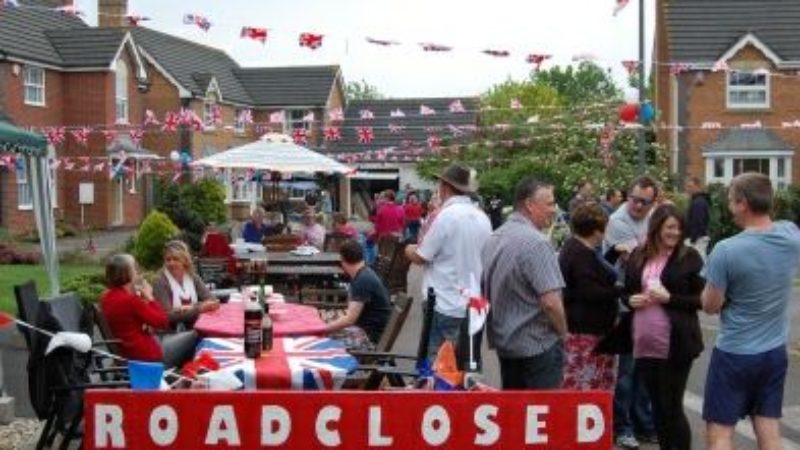
“… Already long ago, from when we sold our vote to no man, the People have abdicated our duties; for the People who once upon a time handed out military command, high civil office, legions — everything, now restrains itself and anxiously hopes for just two things: bread and circuses” – (Juvenal, Satire 10.77–81)
Working just off the Embankment in London, I have spent a lot of time looking at the enormous blown-up photo of the Silver Jubilee which is currently hanging on the Sea Containers building (a visual tribute of truly North Korean proportions) and it has caused me to reflect on my feelings about the Diamond Jubilee celebrations.
As a Labour Party member of 16 years pedigree and no huge fan of the principle of hereditary monarchy, I don’t think I’m alone in having mixed feelings about this weekend’s revels. In fact, I suspect that next week my Facebook newsfeed will be garlanded with photos of my Labour-supporting friends smiling uneasily as they toast the Queen, framed by bunting and royalist décor.
Of course Labour people have a wide range of views towards our royal family, from blue-Labouresque full-throated flag and faith patriotism to po-faced evangelical republicanism, but I suspect for most of us we just prefer to not to think about or question an institution which enjoys stubborn popularity.
This leaves many assuming a kind of practiced ambivalence. They won’t be cheerleaders for the Queen or the Windsors, but they’ll passively enjoy the occasion on a similar level to that of a major sporting event, or say, the Eurovision Song Contest.
However, the street celebrations that will be taking place all over the country offer a great opportunity to build social cohesion. At a time in which people fear and mistrust young people (a recent Barnardos poll showed that 44% of us think young people are ‘feral’) and many bemoan the decline of a ‘community’, these opportunities have to be taken when they arise.
Collective outdoor events in which people can meet and get to know their neighbours perform two important roles. Firstly they enable people to feel more trust and understanding for their neighbours, tackling the fear and suspicion that prevents people from helping and supporting each other for their mutual benefit.
Secondly when people through these events build a wider, more diverse peer group they will feel greater affinity for the local public services people need to make their community a success; the community centre, the library, the caretakers, the schools, the children’s centres. And this solidarity and affinity makes these services stronger and more resilient. This isn’t the Big Society, it’s the Good Society.
In Islington we changed the rules so people can have barbeques in our parks, allowing the many gardenless Islingtonians to enjoy the sunshine and an overcooked Cumberland or Chorizo sausage blanket to blanket with their neighbours. We’ve also made it as easy as possible to hold street parties, and we’ll continue to support street parties in the future. I strongly believe this is an approach that should be taken by all local councils.
There was a great example in my ward last year of how these parties can work so well. Mildmay is a densely populated inner-city ward sitting on the Islington/Hackney border, with about 40% of our households being social housing, yet a house sold for £2.5M last year. We have affluent settled families, young single house sharers privately renting and people struggling to make ends meet, and their peer groups tend to be restricted locally.
At one of our street parties last year there were a group of older people who were visibly suspicious and worried about a gang of young kids who were out on the street. Someone brought the kids over to meet the older people, and they got on like a house on fire. Now not only do the older people no longer go around with such fear, but some of the young people even started visiting the older people and running errands. I’m sure there are countless examples of this kind of happening, and if the Jubilee weekend can help bring people together, rich and poor, young and old, then it will make our communities stronger, and Labour politics thrives in strong communities.
One final thought. In my job as researcher at BritainThinks I sometimes start focus groups by asking people what they feel worried or optimistic about at the moment. The only two events that seem to be cause for any optimism at the moment are the Olympics and the Jubilee, as people are feeling pretty gloomy about everything else. Perhaps the patriotic feelings emanating from those two events can be turned on their head and offer the opportunity for a public discussion about the ‘shame’ of a stagnant economy and persistent child poverty at a time when we are supposed to be feeling so proud of the nation?
Either way, I urge Labour-supporting readers to enjoy a glass of bubbly this weekend and don’t let the sausage rolls stick in your craw.
Joe Caluori is a Councillor in the London Borough of Islington and a researcher at BritainThinks.




More from LabourList
Economic stability for an uncertain world: Spring Statement 2026
‘Biggest investment programme in our history’: Welsh Labour commit to NHS revamp if successful in Senedd elections
James Frith and Sharon Hodgson promoted as government ministers